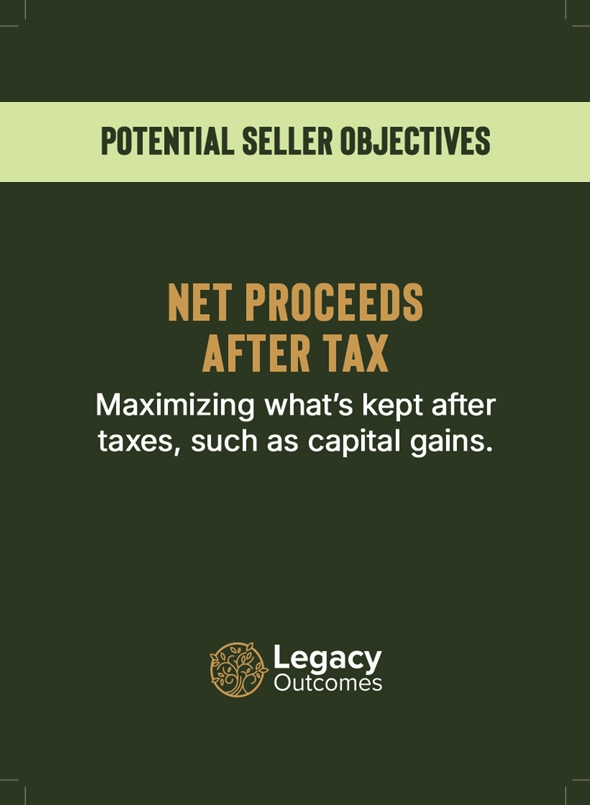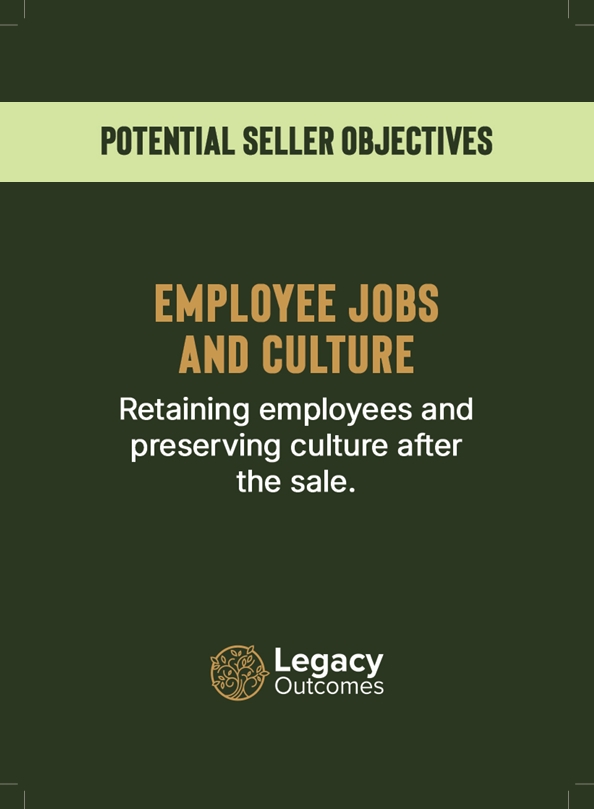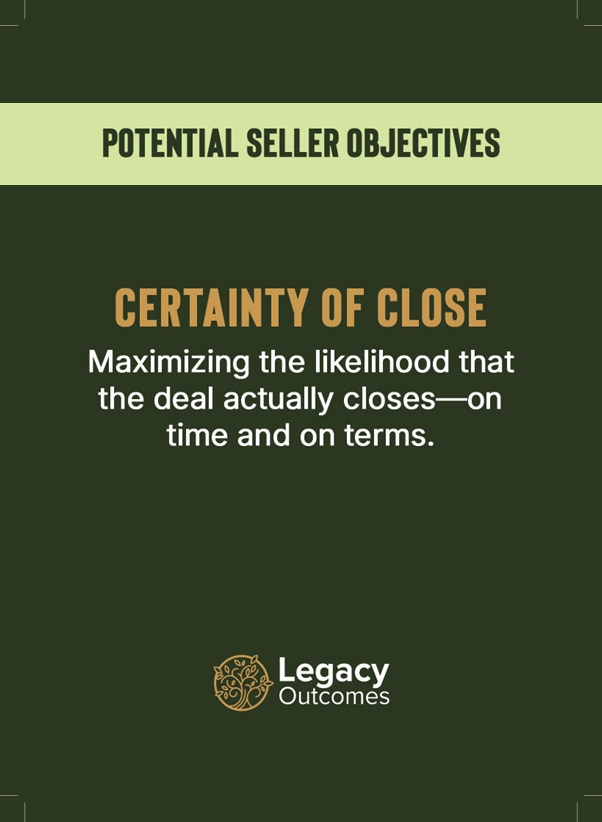






These are sample cards, order the whole deck here.
As my professor Joel Peterson, founding chairman of JetBlue Airways, always said:
“First ask: what does winning look like?”
Most owners say they want “the best deal,” but few actually define what that means in practice. For some, it’s about maximum cash on day one. For others, it’s about preserving their team’s jobs, the company’s reputation, or the values they spent decades building.
Understanding your objectives before you start the sale process is vital. When you’re clear on what winning means to you, an elite M&A team can tailor every aspect of the strategy to achieve those priorities. That clarity protects your leverage — and keeps you in command all the way to close.
Financial and Deal Structure Objectives
Maximum Sale Price
You want the highest possible valuation, driven by competitive tension and strategic positioning.
Trade-offs:
Requires robust preparation, detailed financials, and a clear growth narrative to attract premium buyers. You’ll likely see more buyer diligence, larger holdbacks or performance-based payouts (like earnouts), and deeper negotiations to justify the higher price. Strong systems, a solid team, customer diversity, and optimized cash flow are table stakes.
Guaranteed Cash at Close
You want as much of the purchase price as possible wired to your account on closing day — minimizing deferred or contingent payments.
When it matters:
Sellers seeking a clean break, minimal post-sale obligations, or immediate access to funds.
Trade-offs:
This often means accepting a lower headline price. Buyers paying full cash up front will limit deal complexity and discount for risk they’re assuming. It can also reduce your buyer pool, especially among buyers who prefer creative structures.
Net Proceeds After Tax
A big sale means little if too much goes to taxes.
When it matters:
Sellers with complex estates or high existing tax burdens who want to maximize what they keep — not just the sale price.
Trade-offs:
Achieving this often depends on structural options such as 1042 rollovers through an ESOP sale or F-reorganizations that can defer or reduce taxable gains, timing tactics such as spreading payments across multiple tax years, and reinvestment vehicles like Opportunity Zones to shelter capital gains. Each strategy requires careful planning and strong coordination with your legal and tax advisors — and might influence the pool of buyers willing to accommodate these structures.
Cash Flow Over Time
Rather than one big payout, you may prefer steady income spread over years.
When it matters:
Sellers who want ongoing retirement income, prefer to smooth out tax exposure, or see long-term upside in the buyer’s growth.
Trade-offs:
This typically relies on structures like seller financing, installment payments, retained equity, or earnouts. You take on credit risk (will the buyer make payments?), performance risk (will the business hit targets?), and valuation risk if the business underperforms.
Speed & Simplicity
Some sellers want to get the deal done quickly with minimal friction.
When it matters:
Health issues, family transitions, or a strong desire for peace of mind can make this objective primary.
Trade-offs:
Speed often comes at the cost of maximizing value. You may limit your buyer pool to known or inbound buyers, accept a simpler structure that leaves money on the table, or forgo deeper diligence and marketing that could have created competitive tension.
Freedom from Future Obligations
A true walkaway — no indemnifications, no extended earnouts, no consulting handcuffs.
When it matters:
Sellers retiring fully, those with health considerations, or those wanting zero ties to the business after closing.
Trade-offs:
Buyers will need full confidence in the management team and the quality of the business. You may accept a lower total price or fewer creative terms.
Ongoing Role or Involvement
Some owners want to stay engaged after the sale — on the board, as a consultant, or in a new capacity.
When it matters:
You see future upside, want to guide the next chapter, or care about the company’s continued success.
Trade-offs:
Tying your future time and energy to the buyer’s culture and performance. Fit matters: a poor cultural match can lead to conflict.
Retain Ownership Stake
Rolling equity to keep skin in the game can be smart when you see big upside ahead.
When it matters:
You believe the buyer will unlock growth you couldn’t on your own — and you want to ride that second exit wave.
Trade-offs:
Less cash today, more risk tied to the buyer’s execution. You’ll need clear governance and alignment on future growth, control, and exit plans.
Low Deal Complexity
A simple transaction with fewer moving parts, clean documents, and minimal conditions.
When it matters:
When you’re exhausted, dislike protracted negotiations, or have a straightforward business.
Trade-offs:
Simpler deals attract a smaller buyer pool and usually sacrifice structures that can push up total proceeds.
Certainty of Close
Knowing the deal will actually close — on time, on terms — is priceless for some owners.
When it matters:
Sellers with failed deals in their past, urgent timelines, or major life events at play.
Trade-offs:
You may accept fewer contingencies, stick with buyers with strong close histories, and sometimes accept a slightly lower headline price in exchange for certainty.
People, Reputation, and Social Objectives

Employee Jobs & Culture
You want your people to stay employed and your culture to endure.
Trade-offs: You may limit the pool of buyers, slow the process, or accept a lower offer from one who respects your people and values.

Company Reputation
Keeping your name and your company’s standing intact matters — especially if your identity is tied to the brand or your family remains involved.
Trade-offs: You may exclude buyers who plan to rebrand, restructure, or drift from the values that built your reputation.

Alignment with Buyer Values
Choosing a buyer whose principles for employees, customers, and the community mirror your own.
Trade-offs: Vetting buyers takes time. You may pass on offers that don’t align, even if they’re financially attractive.

Desire to Mentor
Some sellers want to stick around for a time — guiding leadership transitions, supporting customer relationships, or mentoring the next generation.
Trade-offs: Staying on means balancing your time and your sense of closure. Clarity on your role and incentives is key.

Charitable & Inheritance Planning
Aligning your exit with giving or estate plans can make the whole deal more meaningful.
Trade-offs: These goals often require coordinating trust structures, family dynamics, and timing. They can influence when you go to market and the deal structures you consider.

Family in the Business
Ensuring family members who rely on the business keep roles, income, or ownership where appropriate.
Trade-offs: Trust and continuity with the buyer matter. You may need to build time for relationship-building into your timeline.

Real Estate Utilization
Company-owned or controlled real estate can be its own strategic piece: keep, lease back, or sell with the business.
Trade-offs: Tax implications (like depreciation recapture or 1031 exchanges), lease negotiations, and value adjustments can add layers of complexity.
Bringing It All Together
“Don’t just chase the big number. It’s what you keep, when you keep it, and what strings are attached that decide your real outcome. Your deal will likely include some or several of these structural levers — and that’s okay. The point is to understand each one and how they interact to shape your risk profile and net proceeds. That’s what a true, unconflicted sell-side M&A firm does: they help you study every lever in isolation and together — so you can build the final structure that works for you, not for the buyer. Bottom line: you need these tools to create a peak outcome sale.
Up Next:
Deadly Seller Assumptions
Seven common assumptions sabotage sellers — each one erodes leverage, invites buyer advantage, and drives regret. These....

Preserve your legacy by securing the best price, terms, and steward of your employees and company.
quick Links
© Copyright 2025, All Rights Reserved By Legacy Outcomes